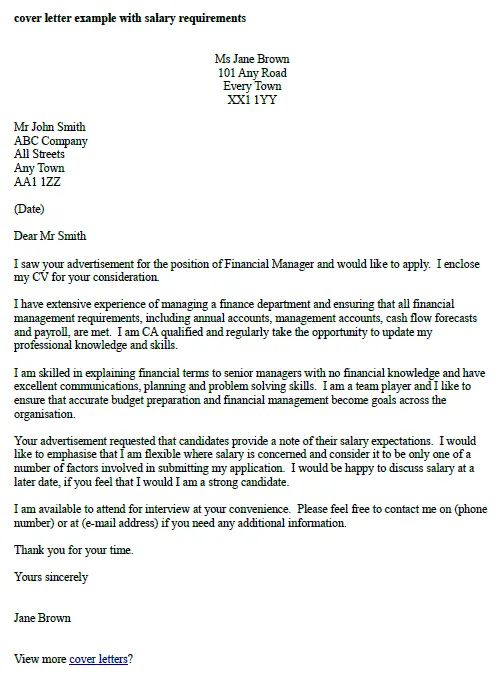Why State Salary Expectations on a Cover Letter?
When applying for a job, the topic of salary inevitably arises. While it might seem daunting to discuss your salary expectations in a cover letter, doing so strategically can be beneficial. Stating your salary expectations can help you avoid wasting time on positions that don’t meet your financial needs. It can also demonstrate that you’ve considered the role and are serious about the opportunity. Furthermore, it gives the hiring manager a clear indication of your financial requirements from the start. Including salary expectations is a way to showcase your professionalism and your understanding of the job application process. This simple act can help you to make sure you and the hiring manager are on the same page.
Understand the Purpose of Salary Expectations
The primary purpose of stating salary expectations is to align your financial needs with the company’s budget. It helps both you and the employer assess whether the position is a good fit. When you state your expectations, you’re essentially signaling your understanding of your worth and the value you bring to the table. This can also demonstrate that you’re prepared to discuss compensation from the outset. Providing a salary range indicates flexibility while also setting boundaries. It’s a way to show that you’re not only interested in the job but also practical about your financial needs. Understanding this purpose will guide you in crafting a cover letter that highlights this information in a professional and strategic manner, increasing your chances of moving forward in the hiring process.
Benefits of Including Salary Expectations
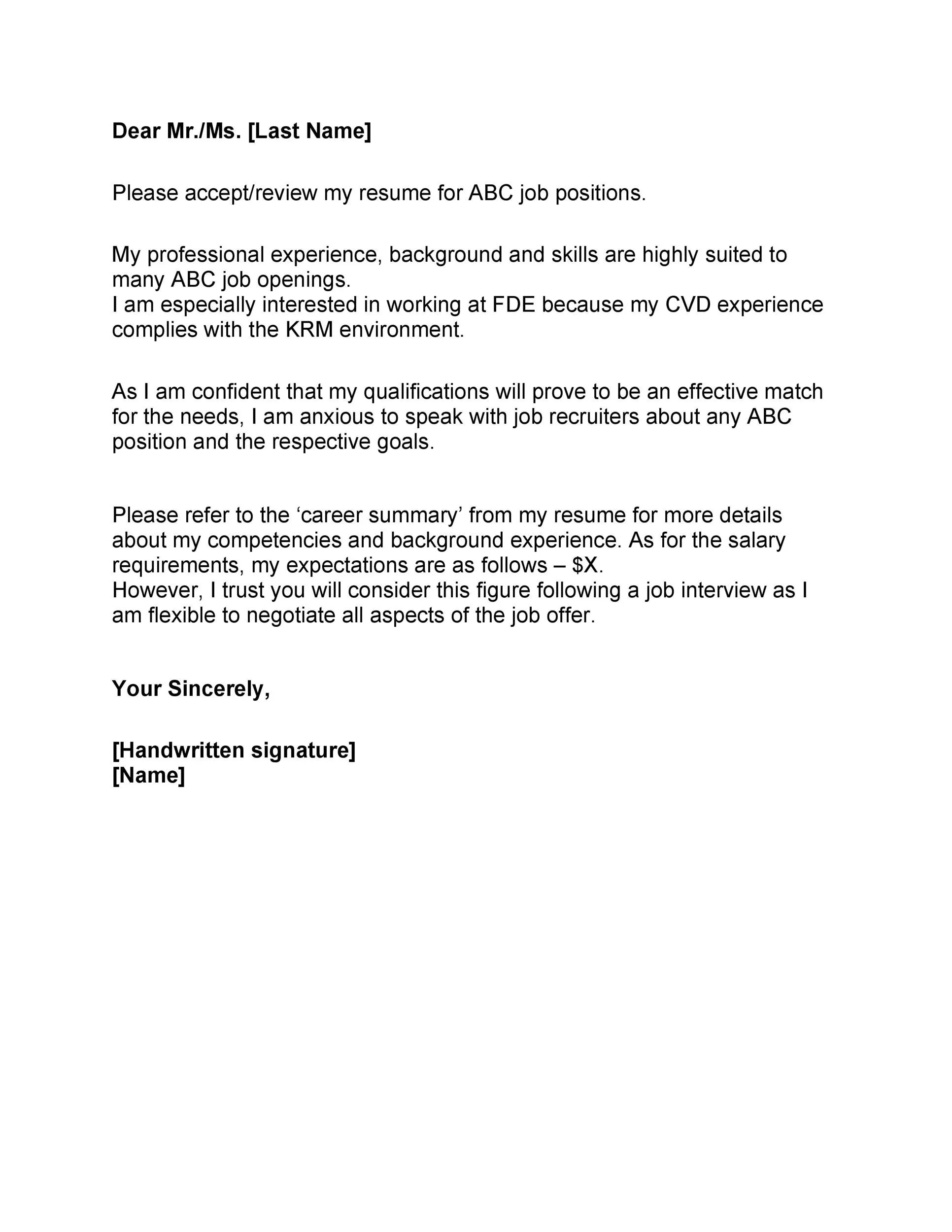
Including salary expectations in your cover letter offers several advantages. First, it saves time for both you and the hiring manager by ensuring that your financial requirements align with the company’s budget. Secondly, it positions you as a proactive candidate who is prepared to discuss compensation. This can enhance your credibility and demonstrate your professionalism. Another key benefit is that it opens the door for salary negotiation if your expectations are met, or if there is room for discussion. It also helps to set realistic expectations, preventing potential disappointment if the offered salary does not match your needs. When you provide this information, you showcase that you are serious about the role and are ready to discuss your value within the company. This strategy can help you focus your job search on opportunities that meet your financial goals.
What to Include When Stating Salary
When mentioning your salary expectations, the key is to be clear, concise, and professional. Always provide a salary range instead of a specific number. This demonstrates flexibility and allows for negotiation. You can start by stating, ‘I am looking for a position with a salary in the range of [dollar amount] to [dollar amount]’. This allows you to show your flexibility while still giving a clear indication of your financial needs. Always tailor your salary expectations to the specific job and the industry standards. Research the average salaries for similar roles in your location to inform your range. Furthermore, if the job description explicitly asks for your salary requirements, make sure to include it. Be mindful of the company’s overall compensation structure, and try to align your range with it. Being prepared and providing thoughtful responses boosts your credibility.
Research Salary Ranges
Before including salary expectations in your cover letter, conduct thorough research. Websites like Glassdoor, Salary.com, and LinkedIn offer valuable insights into average salaries for different roles and locations. Compare your skills, experience, and education to the job requirements to gauge a reasonable salary range. Also, take into account the cost of living in the area where the job is located. Researching industry standards will give you a realistic understanding of what you can expect to earn. If the job description lists a salary range, that’s a great starting point. If not, use your research to determine a suitable range that aligns with your value and the industry norms. It’s also beneficial to consider your overall career goals and how the new position fits within your long-term plan. Accurate research will empower you to make confident and informed decisions.
Use Specific Numbers
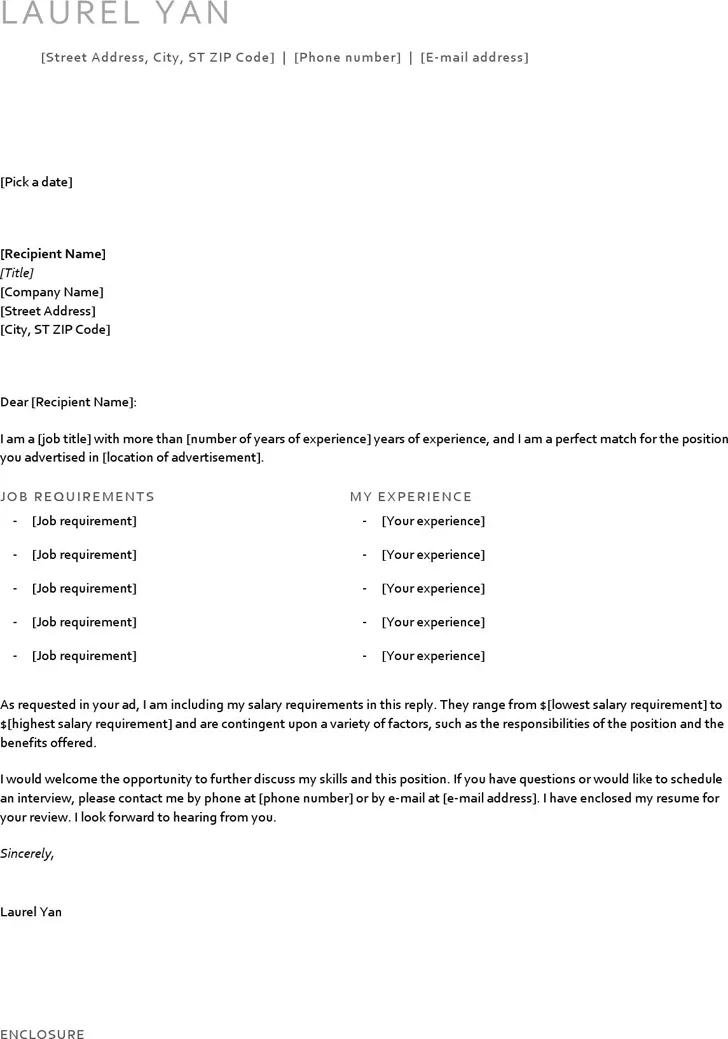
When stating your salary expectations, always provide specific numbers rather than vague terms. Instead of saying ‘I am seeking a competitive salary,’ state a salary range. For example, ‘I am seeking a salary in the range of $65,000 to $75,000 annually.’ Make sure the range is realistic based on your research and the job requirements. The lower end of your range should be the minimum you would accept, and the higher end should reflect your ideal compensation, or the value you bring to the table. Being specific shows that you have carefully considered your worth and are professional. Furthermore, using numbers clearly communicates your expectations. This leaves no ambiguity and helps employers quickly assess whether they can meet your financial needs. Use this technique in your cover letter, and it shows that you are well-prepared and serious about the opportunity.
State Your Salary Expectations Clearly
Clarity is crucial when stating your salary expectations. Ensure that your expectations are easily understood by the hiring manager. Keep it concise and use straightforward language. Include your salary expectations in a dedicated sentence or two, preferably at the end of your cover letter. You may state: ‘My salary expectations are in the range of $XX,XXX to $YY,YYY annually, depending on experience and benefits.’ Or, if the job specifies a need for this information, address it directly and be confident in your response. Make sure that you’re using language that is direct and assertive. Avoid any confusion by stating your range precisely. By presenting your expectations clearly, you show professionalism and ensure that the hiring manager understands your needs. It’s a key aspect of a well-crafted cover letter, helping set the stage for positive and transparent communication.
Where to Place Your Salary Requirements
The placement of your salary expectations within your cover letter is important for maximizing its impact. Consider placing your salary information near the end of the letter, after you have discussed your qualifications and expressed your interest in the role. This approach allows you to highlight your suitability for the job before introducing the financial aspect. Another effective placement is in a separate paragraph, right after you’ve summarized your skills and experience. This ensures that the salary expectations are easily noticeable but don’t overshadow your professional attributes. The placement depends on the job description. If the employer specifically asks for the information in the cover letter, include it in the first paragraph. This shows that you pay attention to detail. Regardless of placement, make sure the information is presented clearly and professionally, ensuring that the employer can easily find and understand your needs.
Placement in the Cover Letter
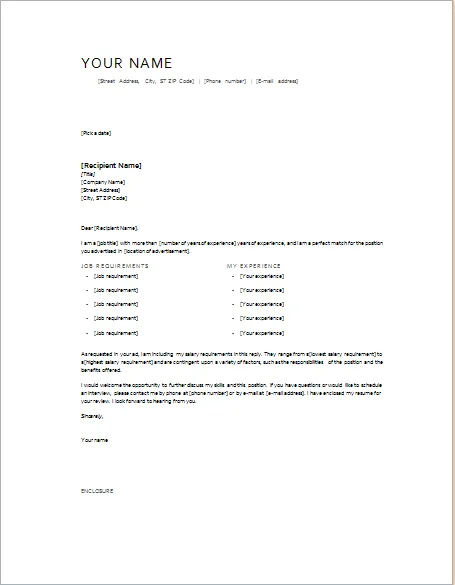
In most cases, place your salary expectations towards the end of your cover letter, usually in the penultimate paragraph. This strategic placement allows you to introduce your skills and enthusiasm before you address compensation. By the time you mention your salary requirements, you’ve already established why you are a strong candidate. This approach ensures that the focus is on your qualifications before your financial needs. If the job description explicitly requests this information in the first paragraph, it is acceptable to include it there. However, in most cases, save it for later. This structure allows you to weave the salary details into your overall pitch. The key is to maintain a professional tone and clarity. By the time you get to this paragraph, you’ve ideally already convinced the hiring manager of your value, making the salary discussion a natural progression. In this way, the placement of your salary information will enhance the overall effectiveness of your cover letter.
How to Tailor Salary Expectations to the Job
To effectively tailor your salary expectations, carefully analyze the job description and the company’s profile. Understand the role’s responsibilities, required skills, and experience level. Research industry standards to determine the typical salary range for similar positions in the location. Consider your own experience, education, and the value you bring to the role. If you have specific qualifications or accomplishments, such as managing complex projects or increasing revenue, highlight them. If the job is at a smaller or lesser-known company, your expectations should reflect that fact. Be realistic, and focus on what you bring to the table. You should also check the company’s website, and resources like Glassdoor or LinkedIn, to determine if there are benefits, like vacation time or bonuses, to factor into your compensation expectations. Tailoring your expectations in this way will show the recruiter that you’re a well-prepared candidate who understands the job and the company. This will enhance your credibility and your chances of receiving a competitive job offer.
Adjusting for Experience and Skills
Your experience and skills are key factors when determining your salary expectations. Assess your professional history, and highlight the accomplishments most relevant to the job requirements. Determine how many years of experience you have in the field and evaluate the level of your skills. Be sure to incorporate any specialized training or certifications you may have. As you consider these factors, it becomes much easier to assess your worth. Use this information to justify your salary range. For instance, if you have more than five years of experience and have demonstrated expertise, you can expect a higher compensation than someone with less experience. If you possess in-demand skills, such as data analysis or project management, you can also command a higher salary. Tailor your expectations to the job’s description and your experience. This helps you to confidently state your needs, because it showcases your value and potential contributions to the company. By presenting your capabilities, you create the opportunity to showcase your value to the company.
Common Mistakes to Avoid
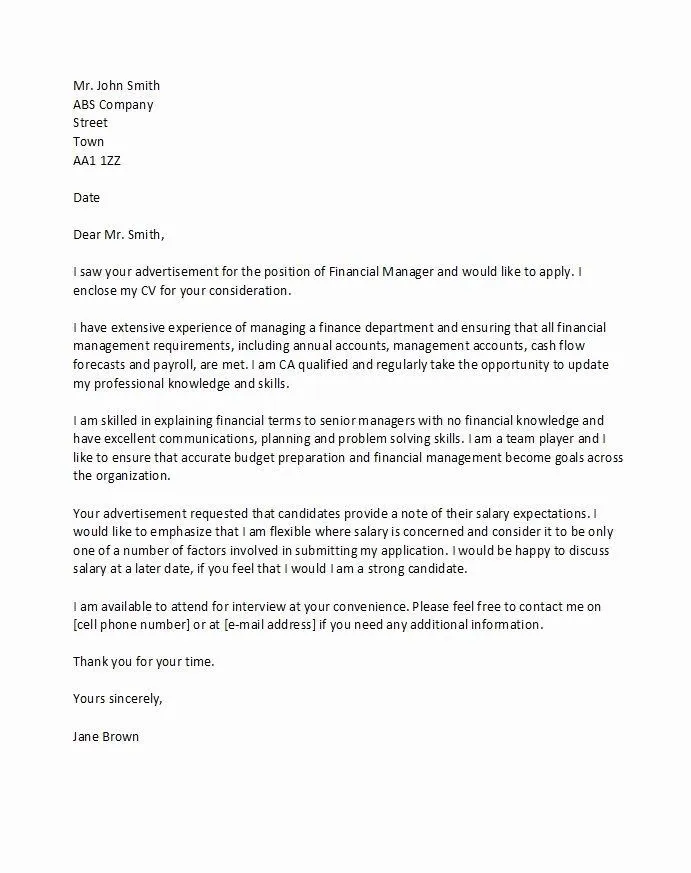
When including your salary expectations in a cover letter, avoid common mistakes that can undermine your chances. Avoid being vague or unclear about your expectations. Instead of stating a general desire for ‘competitive pay,’ provide a specific salary range. Also, refrain from overstating your expectations. Setting your salary too high can quickly eliminate you from consideration, especially if you are not a good fit. Make sure to tailor your expectations to the job requirements and your qualifications. Finally, avoid providing too much information, and keep your focus on your professional achievements and the value you can bring to the company. Always proofread your cover letter carefully to catch any errors that may undermine the message you’re trying to convey. Being clear and focused will help you to make a positive impression.
Being Vague or Unclear
One of the most common mistakes to avoid is being vague or unclear about your salary expectations. Phrases such as ‘competitive salary’ or ’negotiable’ are not specific and do not provide the employer with the required information. Without a specific salary range, the hiring manager may be unsure whether they can afford your services or if your expectations align with the job’s budget. Always provide a clear salary range, ensuring that your expectations are easily understood. For example, you can state, ‘I am seeking a salary in the range of $XX,XXX to $YY,YYY annually.’ This demonstrates that you have researched industry standards and are prepared to discuss compensation. Make sure the range is realistic, based on your skills, experience, and the job requirements. By presenting clear and defined expectations, you show that you are professional and serious. This can help to create a good impression.
Overstating Your Expectations
Another mistake to avoid is overstating your salary expectations, especially if you are a less experienced candidate. While it’s important to know your worth, setting your sights too high can quickly remove you from the competition. Research the typical salary range for the role and location before applying. If your expectations significantly exceed what the employer is willing to pay, you may not be considered, or the employer may reconsider their offer. Make sure that your expectations are in line with your qualifications, the job’s requirements, and the industry standards. It is always possible to negotiate within a reasonable range. Showing flexibility and a willingness to compromise can benefit both you and the employer. Being realistic about your salary expectations is a key part of a successful job search.
The Best Way to End Salary Expectations
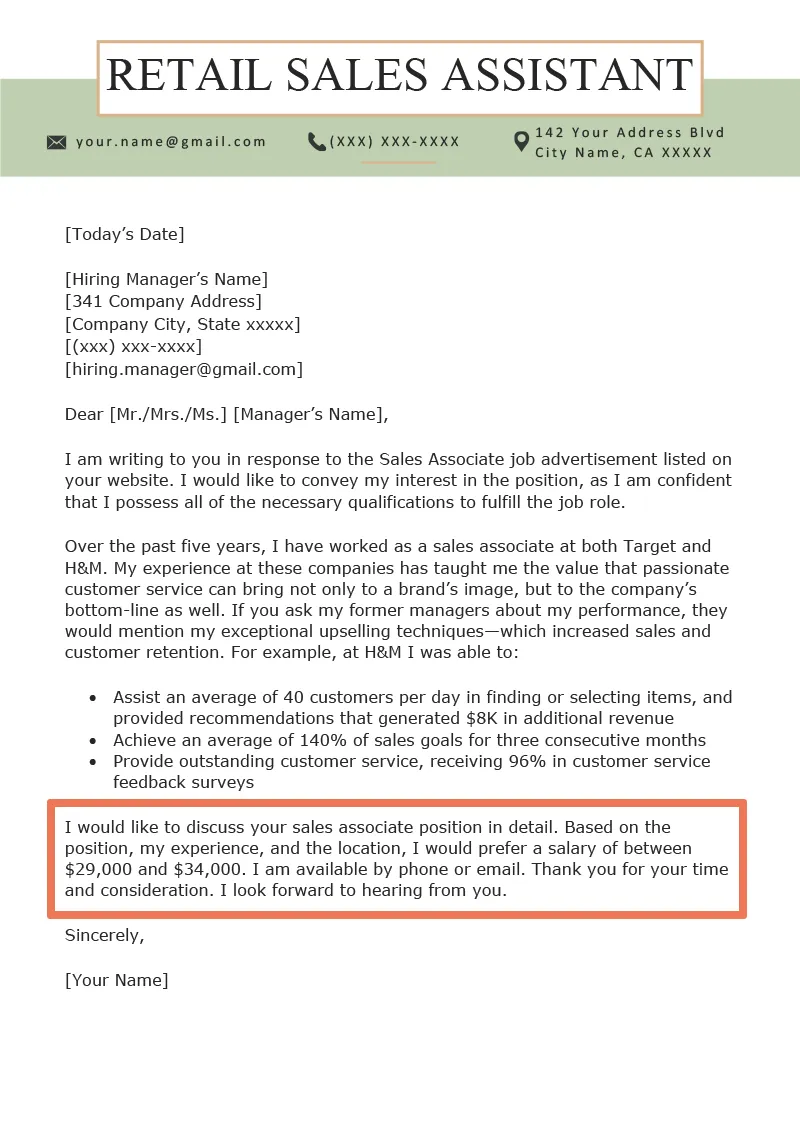
The most effective way to end your mention of salary expectations in a cover letter is to express your flexibility and enthusiasm for the opportunity. You can state, ‘My salary expectations are flexible, and I am confident that we can come to an agreement that meets both my needs and the company’s budget. I am eager to learn more about this opportunity.’ This phrase communicates that you are open to negotiation while reinforcing your interest in the position. You can also express your eagerness to discuss your skills and qualifications further. Ending on a positive note, such as reiterating your excitement about the role or the company, can strengthen your application. Keep the tone positive and professional. This shows that you are not only interested in compensation but also in the overall opportunity. By adopting a well-balanced and positive tone, you create a strong impression.
When Not to Include Salary Expectations
There are a few situations where you might choose not to include salary expectations in your cover letter. If the job description specifically states that you should not include salary expectations, it is important to respect the employer’s instructions. In some cases, if you are applying for a role through a recruiter, the recruiter may handle the salary discussions, making it unnecessary for you to include it in your letter. Also, if you are unsure about the typical salary range for the position, and would prefer to wait until you have more information, you can postpone the discussion. However, in most instances, if the job description asks for it, or you are confident in your research, it is advisable to include your expectations. Always tailor your approach to the specific job, and use your best judgment to make the right decision.
